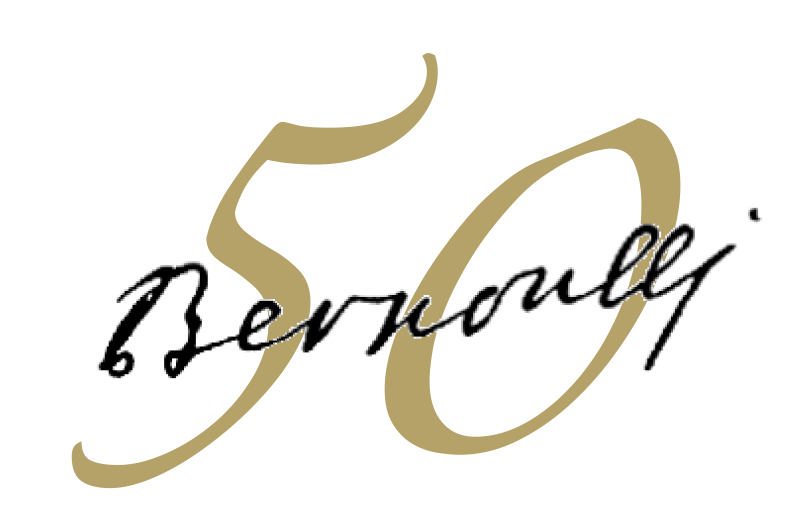Content
- Description
- About Wolfgang Doeblin
- The Prize Committee
- Eligibility for the Prize
- Prize Article
- Sponsorship of the Prize
- Prize Lecture
- Call for nominations
- Doeblin Prize 2024
The prize is to honor the scientific work of Wolfgang Doeblin and to recognize and promote outstanding work by researchers at the beginning of their mathematical careers in the field of Probability.
Description
The Wolfgang Doeblin Prize was founded in 2011. It is awarded bi-annually to a single individual for outstanding research in the field of probability, and who is at the beginning of his or her mathematical career.
The Wolfgang Doeblin Prize is generously supported by Springer. The awardee will be invited to submit to the journal Probability Theory and Related Fields a paper for publication as the Wolfgang Doeblin Prize Article, and will also be invited to present the Doeblin Prize Lecture at a World Congress of the Bernoulli Society, or at a later Conference on Stochastic Processes and their Applications.
About Wolfgang Doeblin
Wolfgang Doeblin was born in Berlin in 1915. His family, of Jewish origin, were forced into exile and settled in Paris, where Doeblin attended the Sorbonne. From 1935, when he began work on Markov chains under Fréchet, until his death in 1940, he was occupied whenever he was able with research in Probability. In this short time he made many deep and original contributions.
From 1938, he served in the French Army and was stationed in defense of the German invasion, which came in May 1940. He was awarded the Croix de Guerre for an action under enemy fire, to restore communications to his unit. Facing capture in June 1940, he took his own life.
Until the invasion, Doeblin had continued to work on mathematics. In February 1940 he sent to the Académie des Sciences de Paris a pli cacheté entitled Sur l'équation do Kolmogoroff. When finally in the year 2000 it was opened, it showed that he had understood many important ideas of modern Probability, including the potential crucial role of martingales.
The Prize Committee
The awarding of the Prize is determined by the Prize Committee. The Prize Committee members are the Chair of the Committee for Conferences on Stochastic Processes, the Managing Editor(s) of Probability Theory and Related Fields, together with four further co-opted members drawn from the Committee for Conferences on Stochastic Processes or the Editorial Board of Probability Theory and Related Fields. The co-opted members are appointed by the President of the Bernoulli Society on nomination by the Chair of the Committee for Conferences on Stochastic Processes, who will consult with Managing Editor(s) of Probability Theory and Related Fields.
The term of each nominated member is two years. The Prize Committee is chaired by the Chair of the Committee for Conferences on Stochastic Processes.
Eligibility for the Prize
The Prize is awarded for work in the field of Probability and it is awarded to a single Individual with outstanding work. It is intended for researchers at the beginning of their mathematical career. Nominees should normally be within 10 (calendar) years from getting their PhD to the prize year (for example, for the 2024 Doeblin Prize, this means anyone who got their PhD in or after 2014) with suitable adjustments to be made for career breaks post-PhD (for example, maternity/paternity leave or military service).
Prize Article
The awardee of the Prize is invited to submit to Probability Theory and Related Fields a paper which, if accepted, is published as the Wolfgang Doeblin Prize Article.
Sponsorship of the Prize
The Bernoulli Society gratefully acknowledges sponsorship of the Prize by Springer, consisting of 2500 Euros.
Prize Lecture
The awardee of the Prize is invited to present a Doeblin Prize Lecture in the next World Congress of the Bernoulli Society or the next Conference on Stochastic Processes and their Applications, whichever happens first. The Bernoulli Society will sponsor the participation of the speaker in the corresponding World Congress or SPA Conference.
Call for nominations
The Bernoulli Society for Mathematical Statistics and Probability welcomes nominations for the 2026 Wolfgang Doeblin Prize.
The Wolfgang Doeblin Prize, which was founded in 2011 and is generously sponsored by Springer, is awarded biannually to a single individual who is in the beginning of his or her mathematical career, for outstanding research in the field of probability theory. Nominees should normally be within 10 (calendar) years from getting their PhD to the prize year with suitable adjustments to be made for career breaks post-PhD (for example, maternity/paternity leave or military service).
The awardee will be invited to submit to the journal Probability Theory and Related Fields a paper for publication as the Wolfgang Doeblin Prize Article, and will also be invited to present the Doeblin Prize Lecture at a Conference on Stochastic Processes and their Applications.
To nominate a candidate, please provide the following documents:
- A two-page Curriculum Vitae (CV) highlighting the nominee's academic background, professional experience, and honors/awards received.
- A list of publications.
- A document of at most five pages describing the nominee's work and placing it in context for importance. This document should outline the key mathematical contributions, their significance, and their impact on their respective field(s).
- Between two and four letters of recommendation.
More information about the Wolfgang Doeblin Prize and past awardees can be found at https://www.bernoullisociety.org/prizes?id=158
Each nomination should be sent by January 31, 2026.
Nominations should be communicated to the Award Committee by sending an email to This email address is being protected from spambots. You need JavaScript enabled to view it. with subject heading: Doeblin Prize 2026.


